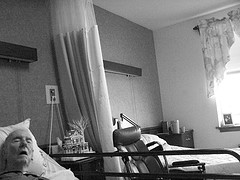
Medicare fraud and brazenness seem to be pairing up with troubling frequency these days, as individuals determined to illegally enrich themselves at the taxpayers’ expense are coming up with increasingly blatant schemes. We learn about these fraudulent endeavors when the fraudsters are caught stealing, but unfortunately, as we have discussed in our blogs, many of the schemes have gone unpunished. But San Francisco qui tam lawsuit attorney Gregory J. Brod would point to one scheme in particular in Detroit that was recently uncovered and prosecuted for being one of the more brazen cases of Medicare fraud.
According to the FBI’s Detroit Division, a case was unsealed in U.S. District Court in the Eastern District of Michigan on October 8 to which Usman Butt pleaded guilty for his role in a $22 million conspiracy to defraud Medicare. The plea of Butt, a former owner and manager of two metro Detroit home health care agencies, followed that of his former business partner and co-conspirator, Muhammad Aamir, who had already pleaded guilty on August 20.
In the plea documents, Butt admitted to conspiring with others to bill Medicare for home health services that were not actually provided, nor were medically necessary and that were procured through the payment of illegal kickbacks. Through the scheme, which ran from 2008 through January 2013, false claims were submitted to Medicare that resulted in the program paying out approximately $12,607,262. Butt specifically admitted that the nursing care services provided by his companies, Prestige Home Health Services in Troy, Mich., and Royal Home Health Care Inc, of Clawson and Troy, Mich., were neither medically necessary nor even needed.
What made the Butt scheme particularly brazen was the fact that he also admitted to having helped a co-conspirator to file a false corporate tax return for Prestige in which the illegal kickbacks were deducted as “business expenses.” That ploy saved Prestige at least $321,485 in taxes that were due for 2009.

Sentencing for Butt has been scheduled for Jan. 13, 2015. His case, investigated by the FBI, Health and Human Services Office of the Inspector General and IRS, represents another success story for the federal government’s Medicare Strike Force, which, since its inception in 2007, has charged nearly 2,000 defendants with more than $6 billion in collective fraud against Medicare.
While the case against Butt and other successful cases that the Medicare Fraud Strike Force has pursued have been encouraging developments in the fight against Medicare fraud, conservative estimates of the value of schemes that may slip by the government’s watch every year have been pegged at $100 billion per year, and more generous estimates place the total much higher at upward of $300 billion every year.
Continue reading
 Healthcare Fraud Lawyer Blog
Healthcare Fraud Lawyer Blog


 Medicaid patients, they are required to pay a rebate to the states. Manufacturers submit a Quarterly Report that includes data on each individual drug including the Average Manufacturer Price (“AMP”) and the “Best Price.” The Best Price is the lowest price at which the manufacturer sells the drug to any outpatient purchaser nationwide. It takes into account volume discounts, cash discounts, rebates, and any free goods offered with that drug. Best Price excludes a few explicitly laid forth prices such as the amount charged to the Veterans Administration and the Indian Health Service. Using the AMP and Best Price information, the Centers for Medicaid and Medicare Service will tell the manufacturer what rebate the state is owed.
Medicaid patients, they are required to pay a rebate to the states. Manufacturers submit a Quarterly Report that includes data on each individual drug including the Average Manufacturer Price (“AMP”) and the “Best Price.” The Best Price is the lowest price at which the manufacturer sells the drug to any outpatient purchaser nationwide. It takes into account volume discounts, cash discounts, rebates, and any free goods offered with that drug. Best Price excludes a few explicitly laid forth prices such as the amount charged to the Veterans Administration and the Indian Health Service. Using the AMP and Best Price information, the Centers for Medicaid and Medicare Service will tell the manufacturer what rebate the state is owed.  Walgreens 2008: Switching Between Pill Types For Profit
Walgreens 2008: Switching Between Pill Types For Profit 



 In the world of
In the world of  McKnight’s Long-Term Care News and McKnight’s Assisted Living News provide news updates to individuals in the senior care arenas. Recently,
McKnight’s Long-Term Care News and McKnight’s Assisted Living News provide news updates to individuals in the senior care arenas. Recently,  called state authorities to report suspicious cars and vans packed full (including the trunks!) wit homeless people. He suspected they might be ambulances wrongfully discarding poorer patients.
called state authorities to report suspicious cars and vans packed full (including the trunks!) wit homeless people. He suspected they might be ambulances wrongfully discarding poorer patients. 